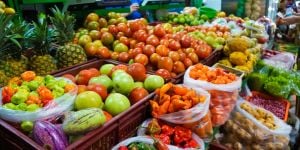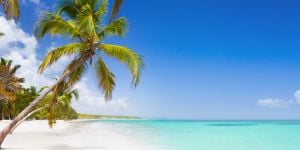Cost of living in Dominican Republic in 2022
Hi everyone,
Two years after the start of the pandemic, it is time to take stock of the evolution of the cost of living in Dominican Republic or more specifically, in the region where you live. The idea is to help people get ready for their expatriation to the Dominican Republic to plan their day-to-day budget for some key expenses.
If you are a tenant, what is your monthly rent? Please give details of the type of property you are in.
How much are your monthly charges (water, electricity, common area maintenance charges, etc.) and additional expenses (mobile phone and/or internet box subscriptions)?
How much do you spend on commuting (by public transport or using your car) each month?
How much does your grocery shopping cost in Dominican Republic?
How much do you spend on health care (health insurance, consultations, etc.)?
How much are your children's school fees, depending on the type of school they attend?
What about your budget for leisure activities?
Do not hesitate to indicate other everyday costs if they could be useful to others.
Thank you for your contribution 
Cheryl
Expat.com team
This is timely as we get asked these questions every single day. I can lay out a number of things but all prices for housing etc are very specific to areas. Some things are more generally priced.
Rent - I live in a high end neighborhood in Santo Domingo. I pay too much money but the tradeoff is I have a 3 minute walk to my office! Its a HUGE apartment, ocean views, some appliances included, 3 bedroom, 3 1/2 bathrooms, 2 secure parking spots. I pay US 1,500 a month.
Car insurance - I have full insurance on my vehicle with all the bells and whistles as its owned by my corporation. Cost annually is about US 650
Transportation - I spend MAYBE US 50 a month on gas and transportation! I have zero commute. Before my move I was commuting 3 to 4 hours a day in stupid city traffic.
Cable / Internet / Phone - Altice triple play with excellent speed of internet 150 down and 50 up. US 65 month with multiple cable boxes etc.
Electricity - one large air conditioner used every single night, guest room air used 1/3 of time, electric on demand hot water heater, I pay about US 58 a month. In summer it goes up a bit.
Mobile phone - I have a plan with Viva, I pay US 19 a month for 200 minutes a month, that roll forward, and unlimited data plan! Here I rarely use my phone line, I call using whatsapp. I currently have over 7,000 minutes banked. Wanna talk, let me know......LOL
Insurance - I have a group medical plan that I manage, I have good quality coverage and the cost is 3,000 RD a month or about US 55 a month, includes dental and prescription coverage.
Medical - almost nothing outside of my insurance.
Clothing / shoes - I buy almost everything online.
Food - well do not use me as a reference. I live alone and hate cooking so I eat very simply. Thank goodness for my air fryer.
I have no kids, no pets currently.
Leisure - I just joined a club not far from me, pool, various sports, weekend entertainment and dancing.... Cost to join 6,500 RD or US 119 and 1,000 RD a month US 18.41 They have a restaurant, bar, social spaces etc. Great deal in Santo Domingo.
And I am a dancer, I go dancing which usually in non pandemic times means at least one concert a month and other nights just going dancing. I am not a drinker so I can have an amazing night for under US 10!
Salon - I do my own hair so trim every 3months is about US 25 to US 35. No color or anything else.
Occasional lunch or dinner out - lunch including drinks US 50 to US 100 at a nice place. I rarely go out for dinner, that needs to change.  Lunch for two - we had the BEST caesar salad EVER, with freshly made juice came to US 20 with tip!
Lunch for two - we had the BEST caesar salad EVER, with freshly made juice came to US 20 with tip!
NOTE - I used 54.3 as the current exchange rate from the bank to calculate.
Hello,
Thank you so much planner for providing us with such well detailed information about the cost of living in Dominican Republic. 
Cheers,
Cheryl
Expat.com team
You my friend are so kind to share all you do. The hours I have spend on this site will save me months of working through mistakes I may have made. Less than a month away from my visit to find an apartment so I can continue on the path to be a winter resident of PC, one day, one day !
Bobby 
Hello Planner,
Thank you very much for all.the details. I live in a 3 bedrooms apt on sarasota and pay $2000.00/mt🙈 My electricity bill is about 4times yours. What area do you live. My contract ends in august and would like to at least get a 3bedroom PH for that price if you know of any.
I am also a dancer and would love to join your club. What's the name?
Looking forward to reading you soon
Claudia
This is so helpful. Planner, thanks so so much for all the details and insight. You have mentioned in the past you own a company. What type of business is it if you don't mind sharing?
Ro
We are in Las Terrenas and have lived in now 5 places over the past 21 months. Hopefully, our house will be finished next month and our responses next year will be quite different!
Rent - We've rented several places here in LT
- We first stayed in our own rental apartment on Playa Bonita. It's a 2/2 in a gated, guarded community on the beach. No ocean view from our apartment, but the beach was just 3 minutes away. Rent in the summer of 2020 was $1800/month.
- We then rented a 2/1 villa in a small, gated residencia close to town. No views, but it was an easy walk to the beaches and restaurants in town. Rent was $750/month with a 12-month rental. If we had renewed in August 2021, the rent was going to be $800.
- Next was a 2/2 villa in a small, gated residencia east of town in La Barbacoa. Rent was $1050 per month with a 5-month rental.
- We then rented a series of small studio bungalows and apartments that ranged from $975 for a month, to $450 for a week. This has been during high season, so we had to take what we could get!
Car insurance - This was a surprise for us! We have a 2019 Toyota 4Runner that the insurance company values at $52k - 20% above what we paid for it. Our full coverage insurance is about $1400 per year - 40% more than we paid in the US.
Transportation - As retirees, we don't have a commute, but driving here is expensive! Regular gasoline is now right at $5/gallon with premium running at about $5.30. We try to be strategic with our trips into town, especially since we drive a bit of a gas guzzler. We have not been venturing out of town except for two trips to Santo Domingo in the past year, and we've averaged $120/month on gasoline. We also pay $50 for our annual registration.
Cable / Internet - Since we've been renting, we haven't had to pay for cable/internet. We will not have cable in our house, only internet for streaming. We have US streaming accounts that require us to use VPN. That runs us $70/year.
Electricity - Electric has been included in our rentals, except for AC usage. We run the AC in our bedroom almost every night. We've averaged $90/month, but that is somewhat skewed by the months in the year-long rental. It was a humidity trap, so we often ran the AC on dehumidify to keep the moisture level down in our bedroom. It was also an older, less efficient AC unit. We're installing solar at our house and should be able to operate off grid most of the time. Installing a system is much cheaper here than in the US and with the uncertainty of the grid, you need a back up!
Medical - We have a great practice here in LT with two doctors who both speak fluent English! Appointments used to about $27, but have now doubled. Still cheap compared to US standards, and insurance reimburses 80%. Medications tend to be cheaper, with the cash price of my Synthroid being less than my copay in the US. Anecdotally, we have a friend here without insurance. He spent 10 days in a private hospital here in LT, including a couple of days in ICU, and his bill was $2500.
Clothing - We mostly buy online or shop when we are back in the US. There are places that the expats call "gua guas" (which is actually a word used for the small local buses) that sell used or sometimes NWT clothing (retailer liquidations?). From what I understand, much of this comes on pallets from Goodwill and other thrift stores. I've shopped on their bargain days where everything is 25 pesos! I've gotten a few tank tops and even a NWT linen shirt
Food - This has been a bad year for food spending for us - especially the last three months in a rental with a dorm-size refrigerator. We've eaten more convenience and processed foods, which are more expensive because we've had very little space to store fresh food. I'm looking forward to a full-size fridge and freezer, as well as a pantry! We try to eat as much locally sourced food as possible, because the expats that continue to buy all the brands and foods they were used to at home have much larger grocery bills! I used to enjoy a box of Lucky Charms about once a year, but at $9/box, it just ain't happening! We have averaged $600/month on "groceries", which includes beer, wine, and alcohol. I was tracking booze separately for a while, but it was less than 10%, so I stopped.
Pet Care - we've found services to be much cheaper! We were paying $60 for grooming in the US, $100 for a mobile visit. Here, we have the groomer come to our house for less than $20. We had to have our dog's teeth cleaned and it was only $75 including one extraction. In the US, that would have been $500 or more. Unfortunately, we also got to experience emergency veterinarian care a few months ago. 48 hours in "ICU", with IVs, meds, and blood tests, was only about $500. We also used a local doggie daycare when we were fostering an overly energetic dog. That ran about $5 for the day.
Salon - We found a place we both really like in town. Hair cut for me is about $22 and for Dave, it's about $12. I do my own wacky color!
Restaurants - Lunch or dinner for 2 with a couple of drinks at a casual place is $40 to $50, with it hitting $75-100 at nicer places. If you go to local Dominican places, you can eat for a lot less. We've fed our construction crew several times, and pica pollo with tostones or papas for 10, along with a couple of big bottles of soda was less than $40.
You can live here very inexpensively IF you choose to live like a Dominican! But if you want to eat out at expat restaurants, buy imported food, order lots of stuff from Amazon (and pay for shipping), and run your AC all the time, it gets expensive!
@planner
I read one of your messages where you were explaining how you had an accident with a guy who was riding Motor Scooter. You went on to explain about your insurance, and having a Case Conductor. You may not have mentioned Insurance and Case Conductor but obviously you had those readily available to you in the event the gentleman had died, to prevent you from going to jail. That scares me to death. Because I have life insurance that offers 1 million in pesos in the event of a catastrophe. What I wasn’t aware of is a Case Conductor and how the case conductor would help me to prevent me from going to jail. From what I understand is if you have a Case Conductor they put you in a hotel until the investigation is completed. Tell me what do I need to do to ensure that in the event something like this happens to me I won’t find myself in a situation where I am loaded off to jail. And is a policy with 1 million pesos enough? I sent this to you in a private email but wasn’t quite sure that you would get it.
To put this back into the thread topic - expats should have full insurance and casa de conductor. Full insurance is not cheap. It is far less expensive than the costs of a serious accident! Investigate with your insurance agent and / or insurance company to make sure you have it!
@planner that said - what will the cost of living outside the capitol and non tourist areas. I was surprised to learn on my last visit that there some parts of the country where basic utilities (electricity and water is free - my Spanish being poor) it was my understanding that the government subsidies folks in this area given that these parts of the country are underdeveloped.
Costs vary dramatically from area to area and your style of living.
There are areas where electricity is subsidized via qualifying for assistance. Same with cooking gas. And some get a card they can use for necessities. It's available for Dominicans.
Typical expat areas are not cheap but if you know how things work you can find the rare gems but generally expats won't know how that works and likely don't want to live in those areas.
@planner
@ddmcghee
Thank you both! Definitely look forward to your posts on topics as you two are plethora of knowledge!
The most expensive areas to live in DR are the resort areas then the capital.
There was a survey carried out by government earlier this year - see link below - and the west region is much cheaper than the capital. The resort areas are not specifically mentioned but for sure they are more costly than the capital.
Expat living is much more than average folk here. Most expats live in the major cities and resort areas and so their costs are high comparatively but will stabilize lower once you get to know where to get best value and adapt to Dominican life.
Living beyond those areas will reap a lower cost of living from, housing to utilities and produce.
Cost of Living in the Campo
@lennoxnev so what was the cost of your home to build how many bedrooms, baths! Total living area! After that expense you’re saying it cost you $3500 a year for all basic expenses?
@lennoxnev @lennoxnev so what was the cost of your home to build how many bedrooms, baths! Total living area! After that expense you're saying it cost you $3500 a year for all basic expenses?
Cost of Living in the Campo
- @lennoxnevGRAWUKU asked and found time to reply in full so see below:I live alongside people for whom the actual cost of living is a fraction of what expats incur living in resort areas and the big cities.The figures mentioned by both planner and ddmghee are factual imo for an expat life in such areas and compare with my experience living in Santo Domingo a couple of years back.But in the campo, it is cheaper and in my rural part of DR a couple of hours north of the capital this is my experience.I have built my own house on a property of 29 tareas and have no property taxes to pay or other debts in relation to living.I don’t pay an electricity despite having asked the supplier several times and their response is that in that area we do not charge. I a battery invertor and have generator power back up to maintain basic services when the power is down.I do not pay any water fees. I have a well with 2HP submersible on my property and 10,000 gallons of roof storage.I have a 100lb propane gas tank and this supplies my gas cooker and Whirlpool washer/gas dryer. It lasts 5 months and the cost of refill last time was just over 3000 pesos so my gas cost is about 600 pesos a month.We have a gas BBQ too for cooking and it is occasionally used.My Altice phone service costs me 580 pesos a month with limited data and call allowances. Occasionally I run out of data and have to top up and have plenty of call time accumulated.We have wi fi by Viva and that is unlimited and costs 1180 pesos a month and is of sufficient speed for Netflix and general and business home activities. No contract.We have Viva satellite TV with some 300 channels and that costs 1150 pesos a month and we have modems for 2 TVs. No contract.My wife, aunt and myself are covered by medical insurance through BHD Maphre and that costs 12500 pesos a month for all of us.We have two cars. Mine is 11 years old and my insurance is 9k pesos annually. My wife has a 4-year-old car and the full insurance is 34k annually. Gas prices are the same across the whole of DR and a trip for me to SD costs about 2k but for my wife about 1.2k. Guagua travel is much less and will be in the order of 100 to 300 pesos locally or all the way to the capital. Oil and filter changes 3 times a year cost about 2300 pesos each time. I maintain good Bridgestone types at all times because roads are unpaved here and rough and a new tyre typically costs 8k and can last at least 3 years.We have good freezer storage. We shop in Carrefour Santo Domingo twice a month when I stock up the things this expat likes such as wine and cheese and frozen produce, but it is clear to me that supermarket costs in the capital are much higher than can be found locally. We do a lot of shopping for fruit and vegetables on the road side and from the passing Toyota pick-ups. They buy from the big markets and sell on with small profit and the locals rely on them. We also shop in a supermarket in Cotui and the prices are much lower than Carrefour and there is a good selection. Even prices in La Sirena in Bonao better the capital.I have planted fruit trees and plantain, banana, sweet potato and yucca on my finca so we make our own fruit juices and get some of the needed carbohydrate in our diet form our land. We are now getting honey from the bees we keep and the chickens give us eggs. We have created a pond with ‘techo de cana’ pavilion overlooking and are about to embark on tilapia farming.My wife’s ‘abuelo’ helps on the land and we try and keep it orderly and plant corn, peanuts, tomatoes and peppers seasonally. I give him a weekly allowance for his help and he benefits from the produce as do all the family.My wife spends more on clothing than me. But she knows where to buy well in the capital where expats won’t go. I live in shorts, polo shorts and T shirts with sandals so my purchases are few online and at Anthony.The salon for my wife costs a few hundred pesos here or in Sabana and more in the capital. I still use my same barber in Bella Vista and tie in a visit to him when in town and the cost is 400 pesos.Covid19 has been restrictive on travel and going out but now hopefully we will get back to travelling more to places in DR like before and stays at resorts. That will add to costs. We are very flexible and now my wife has mobility she is able to spend more time with her mother and father and sisters in the capital. She is quite religious and goes to church gatherings with her aunts and abuela independently. We have lived the resort life together so the novelty has worn off but the beaches of Nagua and LT are just over an hour away and the rios and waterfalls of central DR are close. Been there done that you might say and we are relaxed with campo living.The cost of a large Presidente is now 160 pesos in the colmados in the campo which is huge. I rarely drink beer much in the cooler months and stick to Extra Viejo or Ron Blanco when out and wine at home. I find the specials at Carrefour and still find good French ‘vin de table’ at under 400 pesos. Bravo has good cheap Spanish wines if you look carefully and wait for the 3 for 2 offers.As expats we probably spend in excess of what makes a good life in DR but if you are retired, perhaps one deserves that.Our net spend on living is probably 80k a month then add the ‘expat’ extras which can add up. It could be less and when one thinks of what the locals live with, it can be much less if one is determined.I have not appreciated the current inflation because I don’t specifically check each cost item but rather look at the weekly spend. One can ease back on spending and look for ways to lower the cost by for example buying in bulk one’s rice or dog food or buying more from local vendors rather than supermarkets.Final point. My residency has cost me $30 monthly based upon the past 4 years.You get those options for a cheaper life in the campo.
@lennoxnev @lennoxnev so what was the cost of your home to build how many bedrooms, baths! Total living area! After that expense you're saying it cost you $3500 a year for all basic expenses?
- @K Johnson III
That is within the basic 80k........for most months.....wine, ron blanco and extra viejo and when it is warm Presidente are part of our campo living - 3k a week - but not in the excess at special times.And you buy wine at Carrefore.- @planner
@planner I smiled and was a tad jealous…I don’t have the imagination to live that well.
@lennoxnev campo living = firewood
- @GRAWUKU
Make your relocation easier with the Dominican Republic expat guide

Education in the Dominican Republic
This article will cover the Dominican Republic's educational system, including public schools attended by 80% ...

Death in the Dominican Republic
What customs and procedures are common when dealing with death in the Dominican Republic? Find more about it in ...

Birth in the Dominican Republic
This article provides some information about the culture and the customs of Dominicans when giving birth and ...

Pregnancy in the Dominican Republic
Are you ready to expand your family in the Dominican Republic (DR)? This article should provide you with all the ...

Food and shopping in the Dominican Republic
It is well worth exploring the Dominican cuisine and shopping options, and note what they buy and where they shop, ...

The Dominican Republic lifestyle
Here is some useful information on the Dominican society and lifestyle that will guide you if you are planning to ...

The healthcare system in the Dominican Republic
If you are moving to the Dominican Republic, one of your primary concerns is likely to be the healthcare system ...

Living and accommodation on the South Coast of the Dominican Republic
Along the south coast of the Dominican Republic, going from East to West, you will find the sugar town of La ...
Forum topics on living in Dominican Republic



